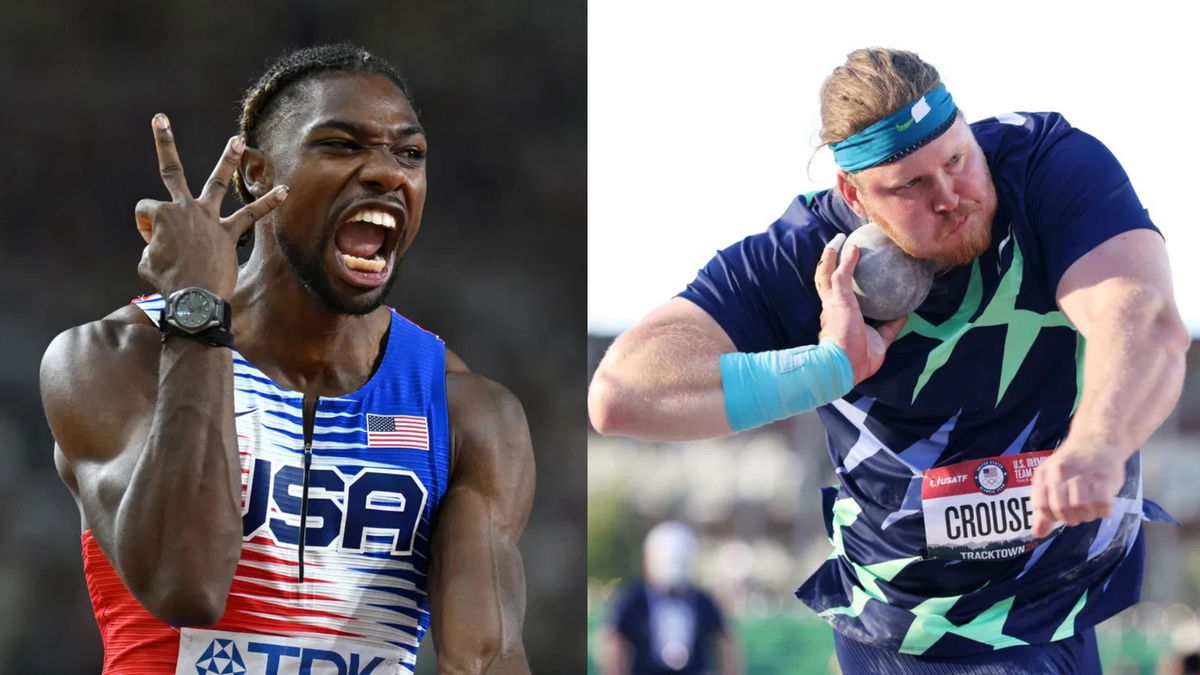
Getty
Image Credits: Getty

Getty
Image Credits: Getty
The euphoria of Olympic gold can quickly fade into a somber reality. Ryan Crouser, the three-time Olympic shot put champion, experienced this firsthand. Despite the immense joy and pride that accompanied his historic victory in Paris, a deep sense of sadness soon crept in. “Coming off the Olympics is always a challenge,” Crouser admitted in an interview, just weeks after the Olympics. But for Ryan Crouser, the aftermath of Olympic glory was anything but celebratory.
Watch What’s Trending Now!
“It’s an interesting conundrum, though, because as an athlete, you’ve trained for four years for this moment. You’ve committed so much to it. And then it goes well and you have this huge success. And then from a brain chemistry standpoint, this massive dopamine rush.” This emotional rollercoaster, however, was not unfamiliar to Crouser.
The sudden drop in dopamine levels, combined with the emotional exhaustion of the competition, can lead to a state of depression known as the “post-Olympic blues.” Having experienced it after previous victories, Crouser sought to understand the underlying causes and find effective coping strategies. The pressure to maintain his status as a three-time Olympic champion only intensified Crouser’s mental health struggles.
ADVERTISEMENT
“Everyone around you expects you to feel super enthusiastic, super happy,” Crouser revealed in an exclusive interview with The Mirror, U.S. “And the biggest thing is you almost feel guilty because you feel like you should be happy, but you don’t really know why you’re not.” The constant pressure to succeed can take a toll on an athlete’s mental health. Crouser’s experience highlights the importance of self-care and emotional well-being, even for the most successful athletes. As Crouser navigates the challenges of post-Olympic life, his story cannot help but resonate with that of fellow American sprinter Noah Lyles’.
Lyles, too, had faced his own share of mental health struggles, including depression and anxiety. Despite these obstacles, he persevered and achieved remarkable success, becoming a role model for athletes worldwide. Lyles’ openness about his struggles inspired Crouser to seek support and prioritize his own mental well-being.

Reuters
Paris 2024 Olympics – Athletics – Men’s Shot Put Final – Stade de France, Saint-Denis, France – August 03, 2024. Ryan Crouser of United States reacts. REUTERS/Kai Pfaffenbach
Following in the footsteps of Lyles, Crouser made a conscious decision to stay active. He quickly returned to training and participated in the Silesia Diamond League, the first of six events over 20 days. This intense schedule, while demanding, proved to be a valuable tool in helping Crouser maintain his momentum and prevent the post-Olympic slump. Just like Lyles, Crouser found solace and strength in being engaged in his sport.
ADVERTISEMENT
“It’s almost good in the sense that it gets me off the couch. It gets me up and having some structure and kind of gets the wheels back turning again of day-to-day life,” Crouser explained. By staying busy and focused on his athletic goals, he was able to avoid the pitfalls of inactivity and regain a sense of purpose. Crouser’s journey mirrors that of Noah Lyles in many ways, who also overcame mental health challenges through perseverance and resilience.
ADVERTISEMENT
From Olympic Gold to mental health resilience, the journey of Noah Lyles inspires athletes like Ryan Crouser and many others
Noah Lyles, the American sprinter, has emerged as a powerful voice for mental health awareness in the world of sports. His candid discussions about his struggles with depression and anxiety have resonated with athletes and fans alike. Lyles has been open about the challenges he faced, including bullying, learning difficulties, and the loss of his brother during the Tokyo Olympics. Despite these setbacks, Lyles has persevered and achieved remarkable success.
“I have Asthma, allergies, dyslexia, ADD, anxiety and Depression. But I will tell you that what you have does not define what you can become. Why Not You!” Lyles posted on social media after his victory in the 100-meter dash at the Paris Olympics. His words serve as a powerful message of hope and inspiration for athletes facing similar challenges. And that’s not the first time that he opened up about the struggles they continue to face.
ADVERTISEMENT
Noah Lyles has also spoken openly about the importance of seeking help and support after the 2021 Tokyo Olympics. “I knew there was a lot of people out there like me who’s scared to say something or to even start that journey,” he said. “I want you to know that it’s OK to not feel good, and you can go out and talk to somebody professionally, or even get on medication, because this is a serious issue and you don’t want to wake up one day and just think, you know, ‘I don’t want to be here anymore.’”
Top Stories
Greg Biffle Plane Tragedy: What Might Have Caused the Crash That Killed the NASCAR Champ and His Family

Jake Paul vs. Anthony Joshua Fight Purse: How Much Are Alycia Baumgardner and Others Earning?

What Is Alycia Baumgardner’s Net Worth in 2025? Career Earnings, MVP Deal With Jake Paul, Biggest Purse & More

Leila Beaudoin Relationship Status: Is the Canadian Boxer Married or Single?

Alycia Baumgardner Boyfriend/Husband: All About Her Relationship Status and Dating History

Alycia Baumgardner Father: How Did He Die? All We Know About Boxing Star’s Parents


Imago
Noah Lyles USA goes down after losing the Men s 200 meter race Paris 2024 Olympic Games, Olympische Spiele, Olympia, OS Day Thirteen, Paris, France – 08 Aug 2024 PUBLICATIONxINxGERxSUIxAUTxHUNxGRExMLTxCYPxROUxBULxUAExKSAxONLY Copyright: xDavexShopland/Shutterstockx 14622973gf
The shared experiences of Ryan Crouser and Noah Lyles highlight the resilience and determination of elite athletes in overcoming mental health challenges, proving that even the greatest champions are not invincible.
ADVERTISEMENT
Pro-athlete or not, we are all humane, after all.
ADVERTISEMENT
ADVERTISEMENT
ADVERTISEMENT

